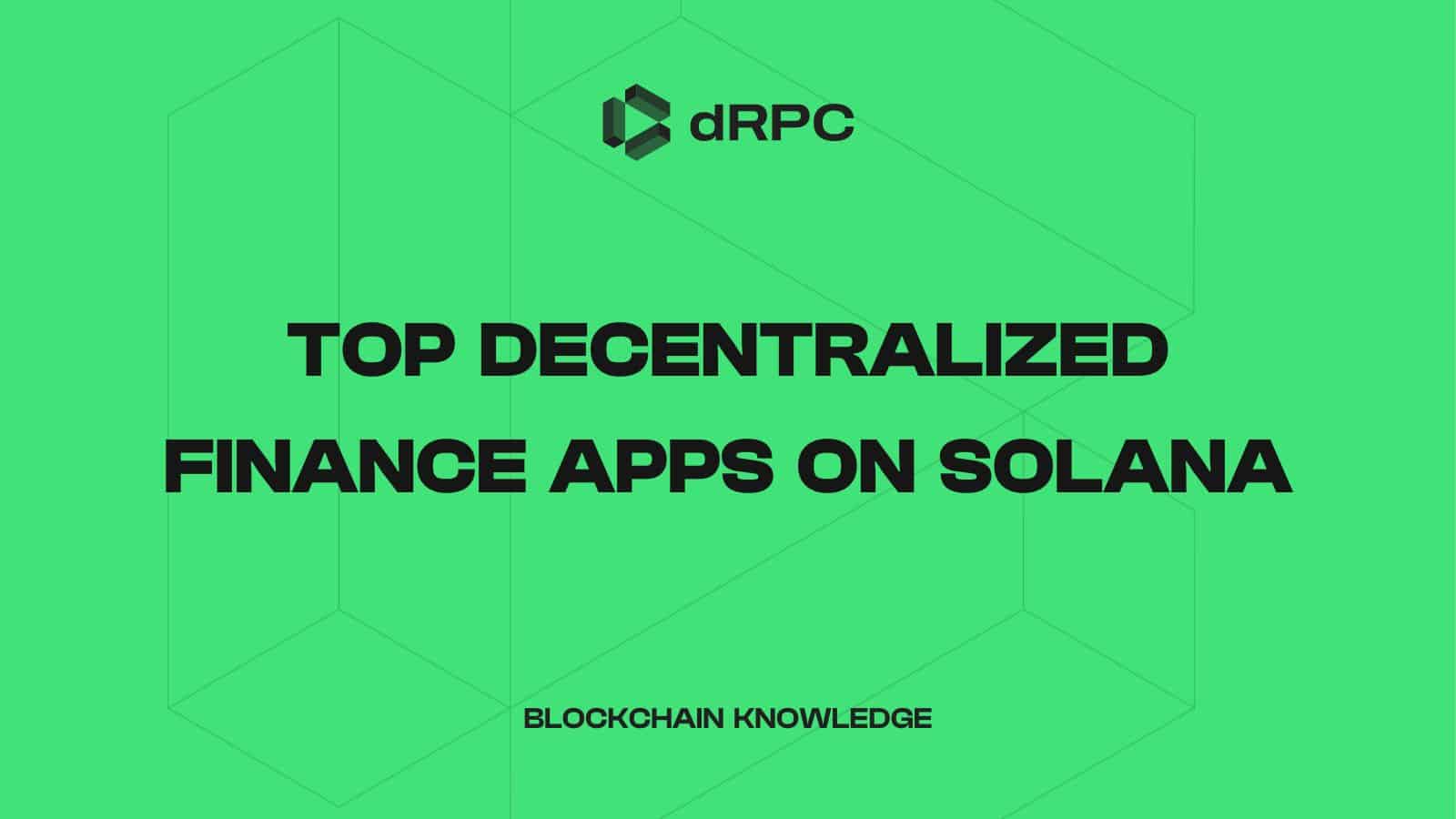Imagine a scenario where transactions occur instantly and expenses are minimal. That’s what Solana delivers. This cutting-edge blockchain is crafted for all, from tech enthusiasts to regular individuals. With rapid performance and affordable fees, it’s transforming the way people interact with technology. This article will examine the distinct qualities that set Solana apart, along with its expanding ecosystem of projects designed to extend blockchain advantages to a wider audience.
Overview of Solana’s DeFi Ecosystem
Solana’s DeFi ecosystem includes key components like smart contracts, decentralized applications, and various financial products, enhancing its market cap and trading volume. This ecosystem thrives due to Solana’s impressive processing times, capable of handling thousands of transactions per second, making it significantly faster than Ethereum.
As a result, users can expect lower fees, allowing a larger number of smaller consumers to participate. The Proof-of-History consensus mechanism designed by Anatoly Yakovenko further supports scalability, providing an efficient means of verifying transactions. The introduction of Solana Pay and stablecoins like PYUSD extends the platform’s appeal by allowing quick and low-cost direct transactions. This level of speed and affordability attracts institutional interest, distinguishing Solana from competitors in the cryptocurrency space.
Additionally, features such as live demos at conferences showcase the innovative products available, boosting engagement and excitement within the blockchain community. The involvement of validators ensures a decentralized structure, protecting the integrity and security of the network while enabling a continuous flow of data and airdrops for active users. For developers and users of DeFi apps, having a reliable Solana RPC node provider is vital to fully leverage these advantages and ensure seamless performance.
Top DeFi Solana Exchanges (DEXs)
Orca
![]()
Orca stands out among decentralized exchanges on Solana due to its unique design and user-friendly interface. With proof-of-history and proof-of-stake mechanisms, it allows for fast transactions, supporting thousands of transactions per second while keeping fees low, often around $0.0025. This efficiency has resulted in a significant increase in liquidity, enhancing trading volume and market cap within the Solana DeFi ecosystem.
Users can easily connect to Orca, which offers a smooth experiencefor trading and swaps, making it accessible for both experienced traders and smaller consumers. Orca emphasizes community engagement by featuring a live demo during industry conferences, allowing users to see the platform’s functionality firsthand. Moreover, its innovative initiatives like airdrops and partnerships with the Solana Foundation attract institutional interest and contribute to ongoing growth.
As a notable competitor against Ethereum and Bitcoin, Orca remains an important part of the Solana protocol, advancing the decentralized finance space.
Raydium
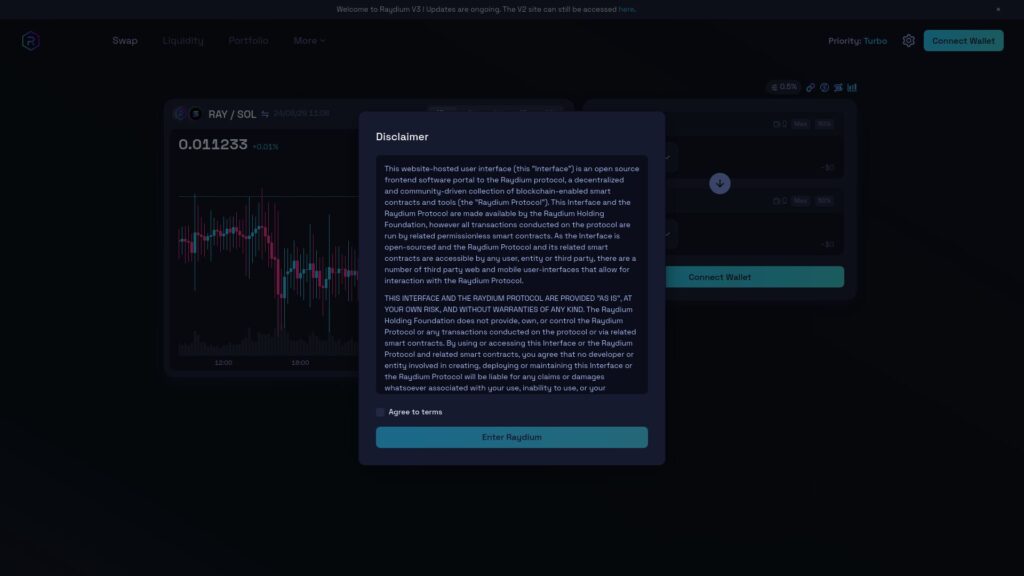
Raydium offers distinct features that set it apart from other decentralized exchanges on Solana. It integrates an automated market maker (AMM) with an order book system, improving liquidity and trading efficiency. By working with the Solana protocol and Serum, it enhances market depth and lowers fees while ensuring fast transaction processing times. Users experience increased trading volume and quicker trade execution, often highlighted during live demonstrations at events.
Additionally, Raydium allows users to stake their SOL tokens or liquidity provider tokens for yield farming opportunities, earning rewards in USD or tokens like PYUSD. This approach fosters interest from both institutional investors and everyday users. With the ability to connect a variety of DeFi projects on the Solana network, Raydium enhances scalability and offers a more intuitive experience.
Through actions like airdrops and innovative tools such as the QUIC protocol, it continues to positively influence the blockchain sector and supports a variety of applications, including trading event tickets and managing data effectively.
OpenBook
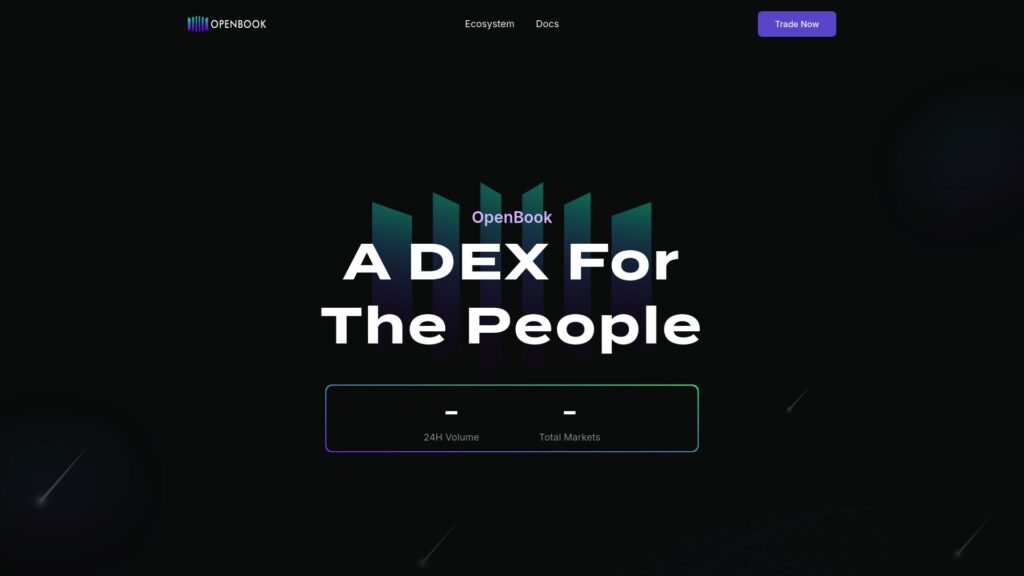
OpenBook connects users to a robust decentralized finance (DeFi) experience on the Solana protocol. Developed by Anatoly Yakovenko and his team, this platform enhances liquidity through innovative features that streamline transactions, allowing for efficient trading with minimal fees.
OpenBook distinguishes itself from other exchanges such as Orca and Raydium by integrating a live demo, showcasing its functionality at conferences, and enabling seamless airdrop participation, which boosts marketcap and trading volume. The proof-of-history mechanism supports rapid processing times, handling thousands of transactions per second while keeping fees low. With the introduction of Solana Pay, everyday consumers benefit from quick exchanges and clear data tracking, helping to decentralize finance further. Institutional interest rises as validators support the network’s scalability and resilience, reinforcing its position in the blockchain industry against competitors like Ethereum and Bitcoin.
The Solana Foundation actively promotes this vibrant ecosystem, enhancing community engagement and ensuring users can easily access their SOL tokens for trades.
Pump.Fun
![]()
Pump.Fun stands out among decentralized exchanges in the Solana DeFi ecosystem by integrating unique features that cater to both new and experienced users. It provides fast processing times with transactions happening in just 400 milliseconds. This speed helps users complete trades quickly, enhancing their overall experience. The platform is designed to connect users to various trading opportunities effortlessly, making it easier to interact with smart contracts.
By facilitating trades with lowfees, which remain below $0.0025, it boosts liquidity and attractiveness in the market. Pump.Fun also leverages the efficient proof-of-history and proof-of-stake mechanisms, allowing validators to secure the network while maintaining low fees. This efficiency draws institutional interest and encourages more trading volume, thereby contributing to Solana’s growing market cap.
Furthermore, events like live demos at conferences showcase its functionalities, including features like Solana Pay and the use of stablecoins like PYUSD. These elements combine to create a rich environment where users can confidently trade in decentralized finance.
Derivatives Markets on Solana
Mango Markets
Mango Markets distinguishes itself in Solana’s decentralized finance ecosystem by emphasizing high-speed transactions and low fees, which are notable advantages of the Solana protocol. It features advanced technologies like proof-of-history, allowing it to process thousands of transactions per second with minimal delays. This capability enables users to connect and access derivatives swiftly and securely.
By implementing a unique model that merges liquidity pools and market maker incentives, Mango Markets provides efficiency for traders, facilitating quick trades at competitive rates. Within the broader blockchain sector, it fosters institutional interest in DeFi by delivering a transparent and efficient trading platform. The liquidity on Mango also boosts the trading volume and market cap of Solana, promoting a more robust economic setting.
With the backing of influential figures like Anatoly Yakovenko and technological advancements from companies like Qualcomm, Mango Markets is influencing the trajectory of decentralized finance by presenting a solution that caters to both small consumers and larger institutional players. The platform also significantly impacts the market capitalizations of related assets, such as PYUSD and SOL tokens, benefiting from both airdrops and smart contracts designed to improve trading experiences.
Jupiter
Jupiter is an integral part of the Solana ecosystem, connecting users to various decentralized exchanges for smoother transactions. By aggregating liquidity, it enables users to find the best prices easily, enhancing the overall efficiency of the DeFi space. This means that people trading on Solana can save on fees while enjoying quicker processing times.
Jupiter stands out because it offers low fees and high transaction speeds, making it attractive to both small users and larger entities interested in institutional trading. It also employs the Proof-of-History mechanism, improving scalability and allowing many transactions to happen almost instantly. With increasing institutional interest, such as the integration of PayPal’s PYUSD, the platform benefits from high trading volumes and a growing market cap, continually proving its influence on the blockchain industry.
Supporting a live demo at a major conference showcased Jupiter’s capabilities and advanced features, reinforcing the effectiveness of the Solana protocol in handling transactions. Through these innovations, Jupiter significantly enhances Solana’s position in the cryptocurrency market.
Drift
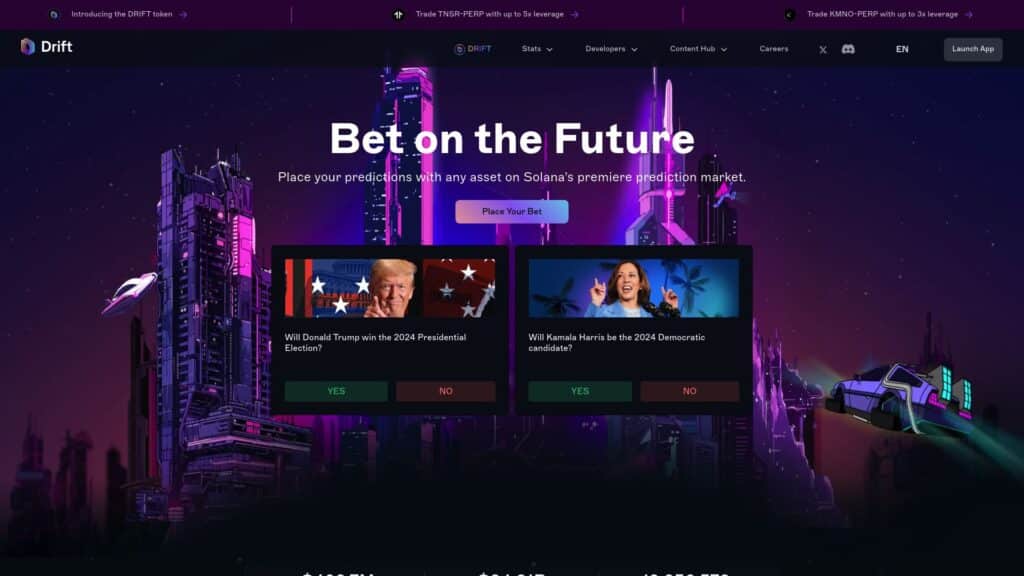
Drift makes a significant impact in the derivatives markets on the Solana protocol, offering a unique space for decentralized finance. Unlike traditional platforms, Drift allows users to connect easily and trade without high fees often seen in the cryptocurrency industry. Its smart contracts and advanced features enhance user experience, making it accessible for consumers, including those who may be new to this area.
Drift employs the proof-of-history system to improve transaction processing times, achieving a faster experience compared to others powered by Ethereum. It also benefits from the low fees associated with Solana, adding to its appeal among traders looking for a competitive edge. However, users should be aware of potential risks, such as market volatility and possible outages in the Solana network, which can affect trading strategies. Rewards may include higher trading volumes and the possibility of earning from airdrops.
Drift stands out by focusing on scalability and userengagement, which, combined with institutional interest, helps drive its growing market cap and user base.
Lending and Borrowing Solutions on Solana
Solend
![]()
Solend improves the lending and borrowing experience for users in Solana’s decentralized finance ecosystem. By offering a user-friendly platform, it distinguishes itself from other lending options on Solana due to its support for smart contracts, facilitating quick and secure transactions, along with lower fees compared to traditional finance methods. Users can access instant loans using their crypto assets as collateral, which helps enhance liquidity in the market.
The Solana protocol’sprocessing times, along with its proof-of-history and proof-of-stake mechanisms, enable efficient transactions with minimal delays.
Additionally, Solend’s integration allows users to connect directly with the Solana network, enjoying features like low USD fees and competitive interest rates. With strong institutional interest and growing market capitalization, Solend cultivates a vibrant trading volume, effectively serving both consumers and smaller users. Events such as live demonstrations at major conferences highlight its capabilities, as Solend continues to support the Solana foundation’s mission of advancing blockchain scalability and accessibility, creating greater opportunities for all during airdrop events and beyond.
MarginFi
![]()
MarginFi offers unique features to users in the Solana DeFi ecosystem, including fast transactions and low fees. The Solana protocol supports high processing rates, handling up to 65,000 transactions per second, which is favorable for traders. MarginFi differentiates itself by providing margin trading, allowing users to borrow against their assets to enhance gains. It employs a proof-of-history mechanism for swift transaction verification, offering an advantage in fast-moving markets.
Additionally, by integrating with Solana Pay, users can easily link their wallets and execute transactions using USD or stablecoins like PYUSD. MarginFi prioritizes risk management with built-in tools that assist users in setting trade limits and managing exposure, helping to protect them from sudden market fluctuations.
With a focus on decentralization and scalability, MarginFi caters to a broad audience, including casual users and those with institutional interest, supporting the growth of the Blockchain industry and enhancing the market capitalization of the Solana ecosystem.
Yield Farming Protocols on Solana
Kamino
![]()
Kamino stands out in Solana’s decentralized finance ecosystem by offering features tailored for yield farmers. It connects users effortlessly, allowing them to take advantage of liquidity pools while enjoying low fees that typically hover around $0.0025. This platform significantly improves liquidity provision by offering faster transaction processing times, enabling users to execute trades efficiently and with minimal delays.
With its innovative integration of smart contracts, Kamino enhances synergies with various DeFi projects on the Solana blockchain, creating a seamless experience for users. Participants can engage with airdrops and maximize yield potential across multiple platforms, leveraging the scalability of Solana to handle thousands of transactions per second. Founded by Anatoly Yakovenko, Solana incorporates both proof-of-history and proof-of-stake mechanisms, ensuring security and decentralization while maintaining the network’s high performance.
The increasing institutional interest and market capitalization of Solana has fostered a thriving environment for initiatives like Kamino, which enhances the overall impact of the blockchain industry.
Meteora
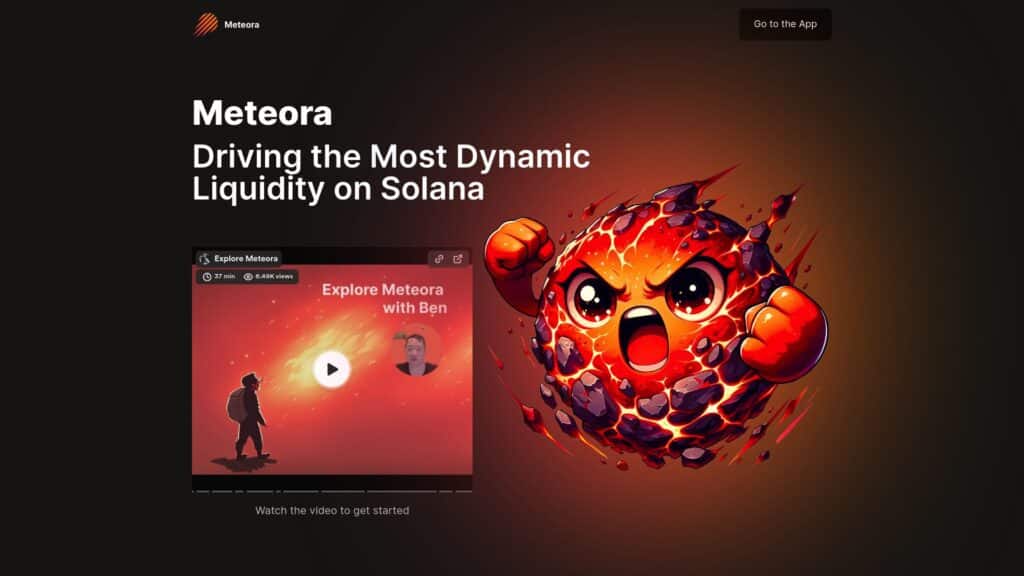
Meteora showcases unique offerings within the Solana ecosystem, focusing on decentralized finance solutions that enhance user experiences. It supports smart contracts, providing a platform that allows users to connect seamlessly and conduct transactions quickly. With its impressive ability to handle thousands of transactions per second, Meteora ensures low fees, making it accessible for new consumers and seasoned users alike.
Unlike other yield farming opportunities, Meteora stands out by integrating advanced features such as priority fees and a focus on securing user data through a decentralized network of validators. This commitment to security helps boost institutional interest in the platform. By implementing innovations like the Proof-of-History and collaborating with the Solana Foundation, Meteora contributes to the blockchain industry’s scalability and growth.
As it facilitates events, such as a live demo at a major conference, it reinforces its significance in the cryptocurrency space, particularly in increasing the market cap and enhancing the liquidity of SOL tokens. The platform also explores options for using other assets like PYUSD, enriching the possibilities for users in the ever-evolving DeFi sphere.
Liquid Staking Options
Jito
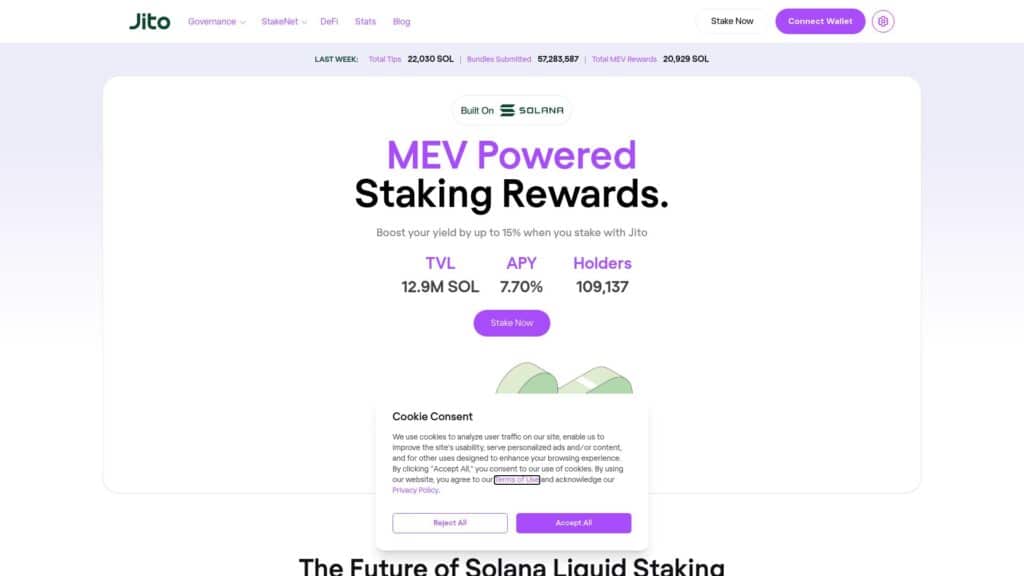
Jito enhances liquid staking options on the Solana blockchain by providing users a way to stake their SOL tokens while having access to capital, unlike traditional staking methods. This is achieved by allowing users to receive liquid staking tokens in return for their staked assets. Jito improves the efficiency of decentralized finance on Solana by enhancing processing times and reducing transaction fees, making it simpler for consumers and developers to connect with the network.
By implementing a technology called Proof-of-History, Jito ensures that transactions are verified quickly, which is important for maintaining high transaction speeds. Unlike other solutions, Jito differentiates itself by focusing on optimizing the infrastructure for validators and allowing for priority fees. This approach boosts scalability and increases institutional interest, making Solana more attractive compared to other blockchains like Ethereum.
With a strong emphasis on user experience, Jito also supports various DeFi projects, encouraging growth within the ecosystem and contributing to Solana’s impressive market cap and trading volume.
Marinade Finance
![]()
Marinade Finance offers distinctive features for liquid staking on Solana, allowing users to stake their SOL tokens and earn rewards while maintaining asset liquidity. With this service, users obtain a token that represents their staked SOL, enabling involvement in other transactions on the network. This method enhances scalability and provides access to DeFi opportunities without the delays commonly associated with processing times.
Marinade Finance emphasizes security and transparency by employing a decentralized network of validators, ensuring strong protection for users’ funds. The platform routinely audits its smart contracts, fostering trust among users. Consequently, Marinade Finance improves liquidity and efficiency within the Solana ecosystem by enabling fast transactions, reducing fees, and attracting both small users and institutional interest.
The rise in trading volume reflects a deeper user engagement with various DeFi protocols, positively impacting the entire Solana framework. Notable features such as the QUIC data transfer protocol further enhance transaction speed, positioning Marinade Finance as a significant entity in the Solana blockchain sector.
JPool
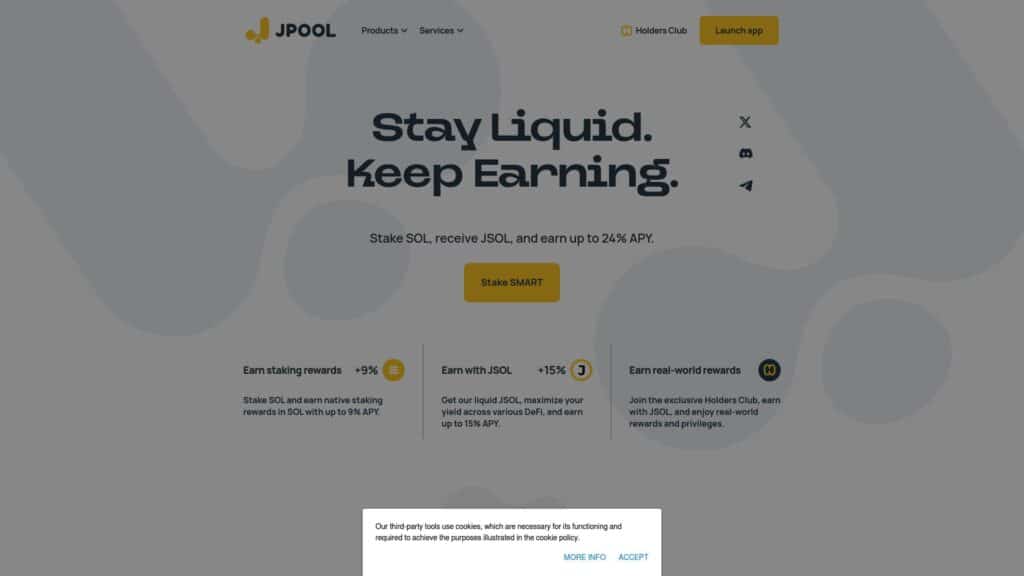
JPool offers a distinctive approach to liquid staking on the Solana network. By enabling users to stake their Sol tokens, it presents competitive processing times and low fees, making it an appealing choice compared to options like Ethereum. JPool merges proof-of-stake and proof-of-history mechanisms to enhance transaction speed and security, benefiting users in decentralized finance.
This contributes to high daily trading volume with efficient priority fees for validators, enhancing network performance. JPool prioritizes user experience, simplifying the process for individuals to connect and engage in DeFi. Furthermore, JPool’s collaboration with Solana Pay facilitates seamless USD transactions, attracting both small users and institutional interest. Users also enjoy features that ensure data security while participating in events or transferring assets, such as event ticket use cases.
With the Solana Foundation supporting this innovation, JPool contributes significantly to the growth of the blockchain industry, all while maintaining decentralization that empowers users.
Arbitrage Bots in the DeFi Space
Photon
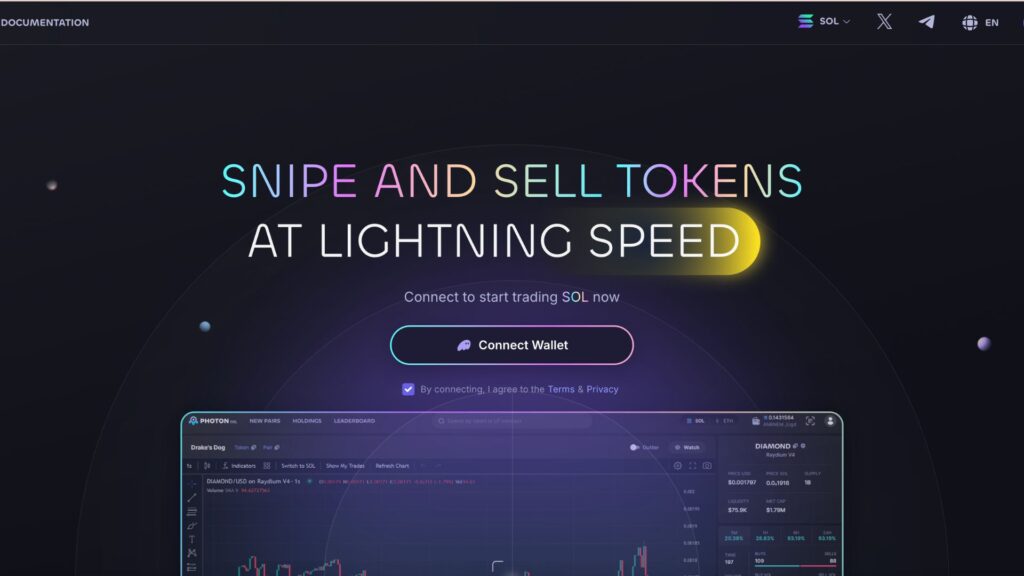
Photon stands out in the Solana DeFi ecosystem by leveraging the high transaction speeds and low fees of the Solana protocol, allowing users to connect swiftly and easily with decentralized finance services. With processing times typically around 400 milliseconds, Photon enhances trading efficiency, making it ideal for handling the quick processing of various transactions like airdrops and event ticket purchases.
It operates effectively amidst the competitive environment of cryptocurrency, including busy networks like Ethereum, where fees can skyrocket. This efficiency contrasts sharply with other bots like BonkBot and SolTradingBot, which may struggle under heavy loads. Photon takes advantage of proof-of-history and proof-of-stake mechanisms, allowing it to compete in the broader blockchain industry by minimizing latency.
Users benefit from these innovations, enjoying a seamless experience while investing in tools backed by the Solana Foundation, with significant market capitalization and trading volume. As interest from institutional players grows, products like PYUSD and SOL tokens improve the potential for robust returns, making Photon an appealing option for both novice and experienced consumers in the market.
BonkBot
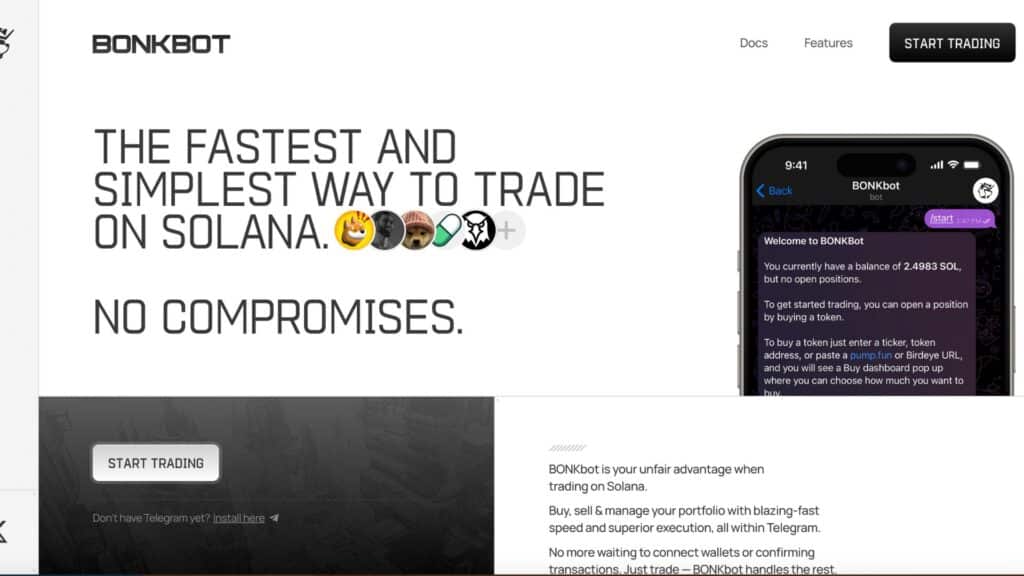
BonkBot stands out in Solana’s DeFi ecosystem by leveraging the proof-of-history mechanism, which allows it to connect transactions quickly and efficiently, enhancing scalability. This unique approach enables users to enjoy rapid processing times, even during high volatility, making trade execution smoother and more reliable. By automating trades, BonkBot helps optimize user strategies and lowers transaction fees, facilitating better entry and exit points for trades.
Given the market cap of Solana and its growing institutional interest, BonkBot contributes substantially to overall liquidity. It increases trading volume by enabling users to capitalize on price differences across platforms swiftly, especially during events like airdrops or when new tokens like PYUSD are introduced. Its design, informed by Anatoly Yakovenko’s vision of a decentralized finance protocol, allows users to participate in the expanding cryptocurrency market seamlessly.
As BonkBot empowers both small consumers and larger stakeholders alike, it strengthens the entire blockchain industry by driving more users to engage in activity within Solana’s efficient network.
SolTradingBot
![]()
SolTradingBot offers unique features that set it apart from other bots in the DeFi sector on Solana. It distinguishes itself with integration of the Solana protocol’s Proof-of-History and Proof-of-Stake mechanisms, enabling rapid transactions, lower fees, and enhanced scalability. Users benefit from fast processing times and the ability to connect different assets effortlessly, such as using PYUSD for transactions.
By monitoring market fluctuations, SolTradingBot capitalizes on inefficiencies in the Solana ecosystem, taking advantage of trading volume and price movements to maximize profits during airdrop events or high-frequency transactions. Security measures are significant, as the bot employs advanced encryption and validators to protect user data while ensuring that transactions remain secure and private. The Solana Foundation supports this effort, working towards maintaining a robust network.
During recent live demos at conferences, the bot showcased quick adaptability, invitinginstitutional interest as it proves its reliability against competitors in the blockchain industry. This innovation emphasizes its potential impact for small users in the evolving cryptocurrency market.
Data Aggregation Tools
DEXscreener
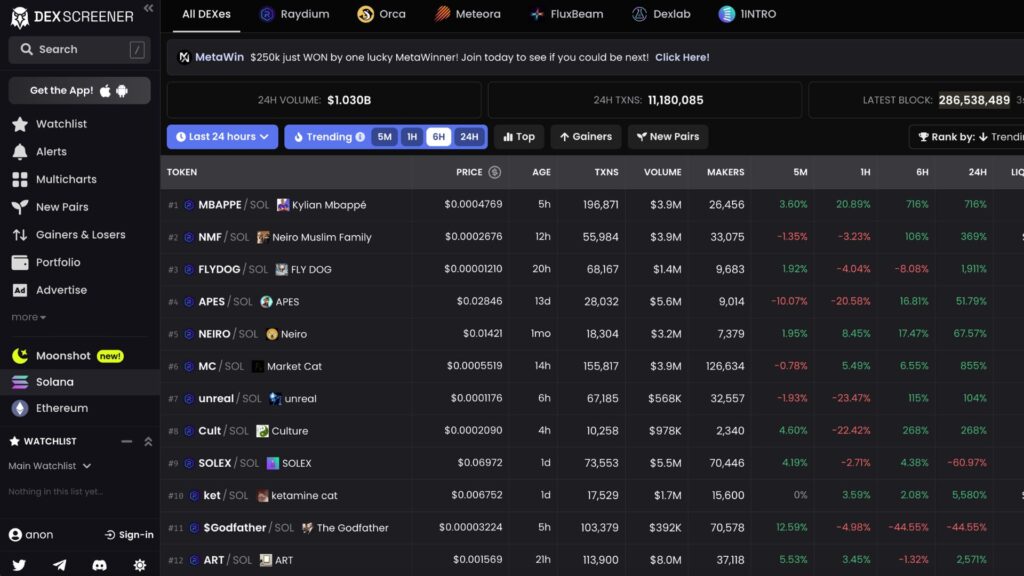
DEXscreener offers users functionalities to analyze decentralized exchanges on Solana, allowing them to view metrics like trading volume, transaction fees, and Solana price movements in real-time. This tool enhances the trading experience by giving users the ability to connect different DEXs seamlessly, ensuring smooth transactions and optimal processing times.
With features that display Solana’s market cap and the impact of events like airdrops, users—including institutional ones—can make better decisions based on accurate data. Developers benefit from insights into smart contract performance and can track liquidity across platforms, streamlining their strategies within decentralized finance. By keeping users informed of fluctuating fees and the performance of validators, DEXscreener supports a higher level of engagement with the Solana protocol.
Supported by innovations like proof-of-history for faster transaction validation and the efficient use of the QUIC protocol for seamless data transfer, DEXscreener is significant to the Solana blockchain industry.
Birdeye
![]()
Birdeye enhances the user experience in the Solana DeFi ecosystem by offering real-time data aggregation, allowing users to connect through a seamless interface. It integrates with various decentralized exchanges (DEXs) and other DeFi projects, providing updated insights on transaction volumes and fees. This supports users who want to understand Solana price movements and market cap trends.
Developers and investors can also access valuable data on institutional interest and transaction processing times, helping them make informed decisions. With features like the live demo presented at a conference and tools for monitoring priority fees, Birdeye is instrumental in navigating the complexities of decentralized finance. As users find themselves dealing with a multitude of blockchains and cryptocurrencies like Bitcoin and Ethereum, tools from Birdeye assist in tracking market movements effectively.
Supported by the Solana Foundation, it addresses scalability challenges and promotes decentralized practices within the ecosystem.
Getting Started with Building DeFi Apps on Solana
To build DeFi apps on Solana, developers need a good understanding of smart contracts and the Solana protocol, especially its Proof-of-History (PoH) mechanism, which allows for faster transactions and better scalability. Knowledge of Rust programming and Solana’s web toolkit is also important for creating effective applications.
Keeping up with market trends and Solana’s performance compared to Ethereum and Bitcoin is crucial, as these factors can influence project decisions. Developers should also be prepared for challenges like network congestion and validator behaviors, especially during high-traffic events.
Using reliable RPC nodes is essential for app performance. Decentralized RPC providers like dRPC offer better security and scalability, ensuring apps remain fast and responsive even during heavy network use.
Engaging with community resources, such as those from the Solana Foundation, can help developers gain insights and solve problems. Staying adaptable and continually learning is key to thriving in the fast-evolving DeFi space.
Future of Solana as the Leading DeFi Playground
Solana has introduced several advancements, including Proof-of-History, to enhance its scalability and support a higher volume of transactions per second. With block times of just 400 milliseconds, the Solana protocol allows for swift processing times, which can attract users interested in decentralized finance. Institutional interest is rising, and live demos at conferences show how Solana Pay enables quick payments in USD with minimal fees.
As regulatory frameworks evolve, they could either encourage or restrict the use of Sol tokens and DeFi applications, impacting market capitalization and trading volume. Active community involvement is significant, as developers can create innovative projects that leverage Solana’s unique features and solidify its position among other blockchains like Ethereum and Bitcoin. The Solana Foundation’s efforts to enhance validators and introduce initiatives like airdrops can engage both consumers and smaller users, fostering growth.
With Anatoly Yakovenko and Qualcomm supporting improvements to its network, Solana is well-positioned to maintain its momentum in the rapidly changing blockchain industry.
About dRPC
dRPC is a RPC node service provider offering fast access to blockchain data from over 70 blockchains across 100+ networks, designed for Web3 developers. The platform features an AI-driven load balancer for efficient workload distribution and provides low-latency access to both full and archive nodes. dRPC emphasizes cost efficiency since they offer services that are 3 times more affordable than traditional providers. It supports unlimited requests per second (RPS) and provides unlimited API keys, catering to projects of all sizes.
The platoform is designed for scalability without performance degradation and offers transparent pricing based on actual usage. dRPC also focuses on privacy, using IP addresses only to route requests and ensuring user data remains secure. The platform includes advanced features such as front-running protection and cross-verification to enhance transaction reliability and security. Additionally, dRPC provides 24/7 dedicated support and detailed analytics for better infrastructure management.
The platform is trusted by several prominent partners in the blockchain space, such as SushiSwap and Lido DAO, who value its reliability, cost-effectiveness, and strong customer support. dRPC is ideal for developers looking for a flexible, reliable, and cost-effective solution for managing their blockchain infrastructure.
FAQ
What is Solana and how does it differ from other blockchain platforms?
Solana is a high-performance blockchain platform known for its fast transaction speeds and low fees, enabling decentralized apps and crypto projects. Unlike Ethereum, Solana uses a unique Proof of History mechanism, allowing it to process thousands of transactions per second, making it ideal for high-demand applications like DeFi and NFTs.
What are the key features of Solana that make it suitable for decentralized applications?
Solana offers high throughput with 65,000 transactions per second, low fees averaging $0.00025 per transaction, and fast block times of around 400 milliseconds. These features make it ideal for decentralized applications like DeFi protocols and NFT marketplaces that require speed and scalability.
How does Solana achieve high transaction speeds and low fees?
Solana achieves high transaction speeds and low fees through its unique Proof of History consensus mechanism and parallel processing capabilities. By efficiently batching transactions, it reduces confirmation times, allowing thousands of transactions per second at minimal costs, making it ideal for high-demand applications like DeFi and NFTs.
What role does the Solana token (SOL) play within the ecosystem?
The Solana token (SOL) is used for transaction fees, staking to secure the network, and participating in governance. Users can stake SOL to earn rewards and to help validate transactions, while developers can use it for funding dApps and decentralized finance projects.
What are some potential use cases for Solana in the future of blockchain technology?
Potential Solana use cases include decentralized finance applications for rapid transactions, NFT marketplaces for high-speed trading, gaming platforms enabling real-time asset integration, and supply chain solutions leveraging transparency and speed for tracking goods.
